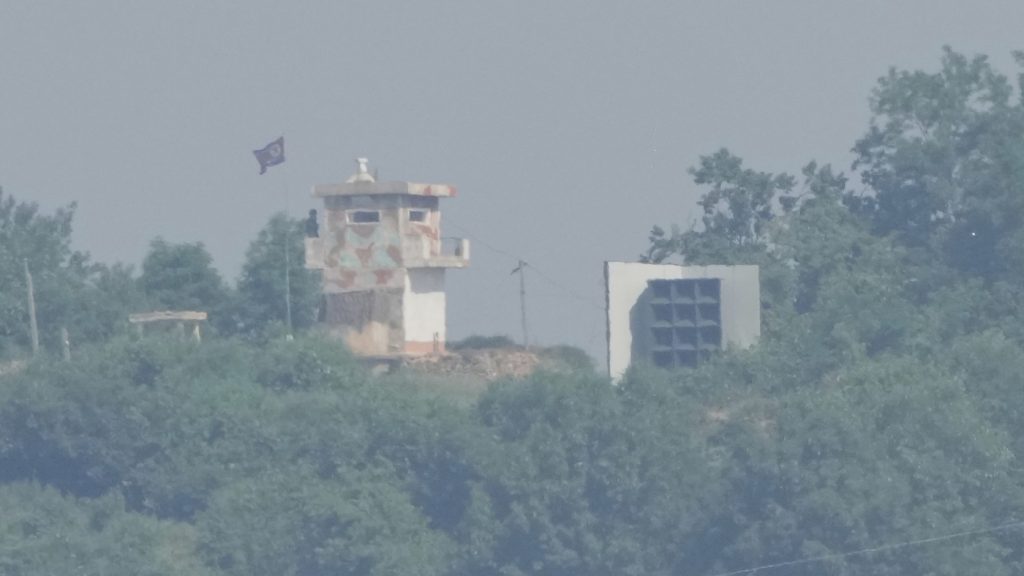Listen to the article
South Korea Ceases Border Loudspeakers in First Step Toward Easing Tensions with North
South Korea’s military has silenced its loudspeakers broadcasting anti-North Korean propaganda along the heavily fortified inter-Korean border, marking the first concrete step by President Lee Jae-myung’s new liberal government to reduce tensions with its northern neighbor.
The Defense Ministry announced Wednesday that the broadcasts, which had been blaring K-pop music and criticism of North Korea’s leadership since June last year, were terminated on Lee’s orders as part of efforts “to restore trust in inter-Korean relations and promote peace on the Korean Peninsula.”
Presidential spokesperson Kang Yu-jung described the decision as a “proactive step” aimed at reducing military tensions and alleviating hardships faced by South Korean residents in border areas, who have endured North Korea’s retaliatory broadcasts of howling animals, pounding gongs, and other disruptive sounds.
The psychological warfare had escalated last year when North Korea flew approximately 7,000 trash-laden balloons toward South Korea in 32 separate incidents between May and November. These balloons carried wastepaper, cloth scraps, cigarette butts, and even manure. In July, debris from one such balloon landed on the South Korean presidential compound, raising security concerns about vulnerable government facilities.
South Korea had reactivated its loudspeakers in response to this balloon campaign, deliberately selecting content that would provoke Pyongyang’s leadership. The broadcasts included South Korean pop music and cultural content at a time when Kim Jong Un’s government has been aggressively trying to eliminate South Korean cultural influences among North Koreans to strengthen his family’s dynastic rule.
By Thursday morning, South Korean military officials noted that North Korean broadcasts were no longer audible in frontline areas, though it remains unclear whether Pyongyang has officially halted its counter-propaganda campaign.
Lee, who took office last week after winning an early election following the impeachment of conservative President Yoon Suk Yeol, campaigned on promises to improve relations with North Korea. During his inaugural address, he pledged to reopen communication channels with Pyongyang, which had rejected all dialogue offers from both South Korea and the United States since 2019 when nuclear negotiations between Washington and Pyongyang collapsed.
On Monday, South Korea’s Unification Ministry also urged civilian activists to cease flying anti-North Korean leaflets across the border, warning such activities “could heighten tensions on the Korean Peninsula and threaten the lives and safety of residents in border areas.”
Despite these conciliatory gestures, prospects for immediate improvement in inter-Korean relations remain dim. North Korea has shifted its foreign policy priority firmly toward Russia, supplying thousands of troops and substantial military equipment for Moscow’s war in Ukraine. South Korean and American officials worry that Kim could receive Russian technology transfers that would enhance his nuclear weapons and missile programs.
The situation grew particularly tense under Yoon’s administration, which emphasized strengthening military alliances with Washington and Tokyo. In a sharp response to Yoon’s policies, Kim declared in January 2024 that he was abandoning long-standing goals of peaceful unification with South Korea and directed constitutional changes to designate the South as a permanent “principal enemy.”
North Korea’s nuclear capabilities continue to advance, with Rafael Mariano Grossi, director of the International Atomic Energy Agency, reporting Monday that the UN nuclear watchdog is monitoring signs of a potential new uranium-enrichment facility at North Korea’s main Yongbyon nuclear complex.
After years of aggressive weapons development, North Korea now possesses a diverse missile arsenal potentially capable of striking targets throughout Asia and reaching the U.S. mainland, while Kim has simultaneously called for increased production of nuclear materials to expand his weapons stockpile.
Verify This Yourself
Use these professional tools to fact-check and investigate claims independently
Reverse Image Search
Check if this image has been used elsewhere or in different contexts
Ask Our AI About This Claim
Get instant answers with web-powered AI analysis
Related Fact-Checks
See what other fact-checkers have said about similar claims
Want More Verification Tools?
Access our full suite of professional disinformation monitoring and investigation tools




11 Comments
While this is a welcome development, the broader issues driving tensions on the Korean Peninsula remain unresolved. Sustained diplomacy and compromise will be needed to make real progress.
Suspending the propaganda broadcasts is a pragmatic step, but the legacy of distrust and hostility between the two Koreas won’t be easily overcome. Patience and perseverance will be required.
Agreed. Rebuilding trust and normalizing relations will be a gradual process. Both sides must demonstrate good faith and a genuine commitment to peace.
I wonder how North Korea will respond to this gesture from the South. Hopefully, it can lead to further constructive dialogue and gradual improvement in cross-border relations.
Yes, the challenge will be maintaining momentum and building on this initial progress. Both sides have to show good faith and compromise to make real progress.
It will be interesting to see if this move by South Korea encourages North Korea to reciprocate with any concessions of their own. Mutual de-escalation is key to improving the security situation.
Absolutely. Any goodwill gestures from the North would be a positive sign and could open the door for more substantive negotiations.
The use of propaganda and psychological warfare has clearly exacerbated tensions on the Korean Peninsula. Suspending these tactics is a necessary first step towards easing military confrontation.
This move by South Korea is a positive signal, but the ultimate test will be whether it leads to further confidence-building measures and a de-escalation of military posturing on the peninsula.
Interesting to see tensions easing between the two Koreas. Suspending the propaganda broadcasts seems like a prudent first step towards restoring trust and promoting stability in the region.
Definitely a positive move. Reducing military confrontation and prioritizing peace is the right approach here.